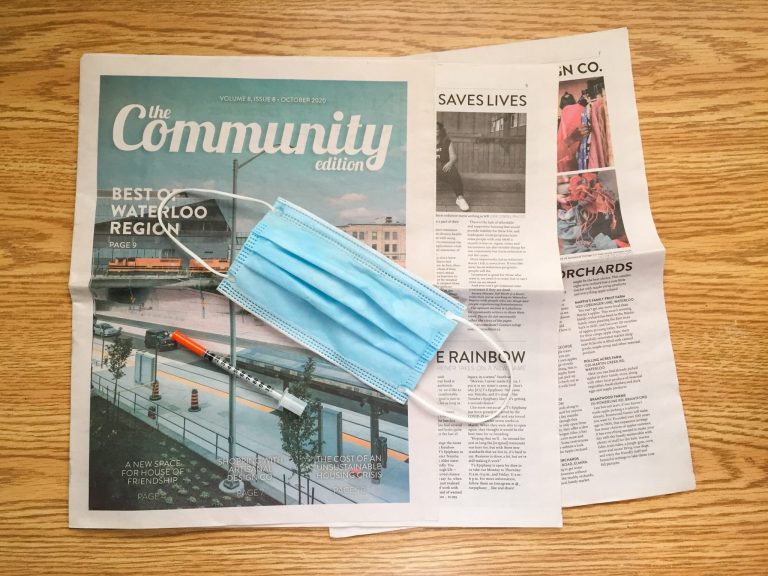Since the pandemic started, there has been an increase in polarizing views, creating division surrounding the issues we’ve all been facing. Friends, family members, and co-workers are clashing over mask use, social distancing measures and most recently, whether vaccinations are safe or effective.
“I think the divisions that we’re seeing during COVID-19 are cutting in multiple directions. One is generational and another is around issues of privilege and social positioning … but then the third division is cutting across political lines,” Dr. Shana MacDonald, associate professor in Communication Arts at the University of Waterloo, said.
So why are we seeing very different conversations and experiences with how people in our community absorb news media? It’s all about what the pandemic looks like for each individual, according to MacDonald and Bruce Gillespie, program coordinator and associate professor of Digital Media and Journalism at Wilfrid Laurier University.
In terms of the generational divide around these issues, MacDonald stressed that it can be difficult for Boomers, also known as the ‘Me’ generation, to believe doing things for the common good is the right choice for them.
“For a generation that’s really tied to their own kind of personal interests [the vaccine] is a hard sell in some ways, because … we can talk about things like public responsibility, and creating 70 per cent vaccination rates in order to control the virus … [but] there are so many competing factors in their value system that it doesn’t always make sense,” MacDonald said.
Boomers may find it difficult to make distinctions between a solidly sourced piece of news media and one that is spreading misinformation, because they didn’t grow up in a digital world, while Gen Z is generally savvier about fake news, misinformation and media literacy.
“If you have a largely retired population who is engaged [in social media], which our parents’ generation is, they are sharing stuff on Facebook as opposed to working with experts,” MacDonald said.
According to MacDonald, social media is the biggest culprit for spreading misinformation.
“We know that misinformation circulates six times more quickly than natural facts and requires that people have an emotional reaction. And so a lot of this is preying on fear, anger, and those already existing fault lines within society,” MacDonald said.
Readers are exclusively getting their news through social media — Facebook, Twitter, Instagram and even Reddit and TikTok according to Gillespie.
People are getting information in a closed system, he explained. Back when readers would be delivered a print newspaper, there was generally a range of different kinds of stories. That’s changed with the advent of social media.
“What we see when people tend to find their news through social media exclusively — it’s more of an echo chamber effect. People probably have very similar opinions to you. And so you’re seeing the same kind of thing. So that’s part of the problem,” Gillespie said.
“The other problem is that fewer and fewer people are relying on legacy news organizations, major news organizations, partly because most of them charge these days.”
MacDonald wants people to examine how our reality is constructed through our social media use — it’s where we are getting all of our information.
“Nobody is seeing the same world anymore. So there’s no real grounding in reality because our world view that we’re getting from social media is constructed and controlled by algorithms — it wants us to stay engaged,” she said.
She explained the problem is also that we are all seeing something different in our social media feed based on our individual algorithms.
“And that’s why we can’t talk to each other anymore, because we aren’t seeing the same reality.”
The other issue is that we are all stuck at home, restricted from our everyday routines and in-person socializing, facing a second wave of COVID-19 in the middle of winter without good mental health structures in place in our society.
In terms of watching out for misinformation and becoming more media literate MacDonald has advice for everyone:
“The rule is, it has to be a verified journalistic source. Apply the standard and ethics of journalism. It must be a [legitimate] publication or the government public health indications coming out of either the municipal, national or federal level,” she said.
MacDonald also advised following superstar medical experts quoted in news sources on social media. Dr. Isaac Bogoch, an infectious diseases physician and scientist at the University of Toronto regularly breaks down the science of the vaccine. Local expert Dr. Kelly Grindrod, the associate professor of pharmacy at the University of Waterloo, posts myth-busting facts about the vaccine that you can share with family and friends who are wary of the side effects.
MacDonald wants you to also ask yourself what kind of reaction the information you are reading elicits.
“Do you have an emotional response to this article that includes fear, anger or disgust? Maybe facts are boring. Facts will not draw you. In reality, those are things that you can put in check.”
There’s a lot of information being presented to us regarding COVID-19, politics and the vaccine and we all want to know how we can decipher what is correct and what is simply misinformation.
“I think, as readers, we have every right to say, I’m not going to take you at face value, I want you to show me the research, but at some point, you have to take the experts at their word because that’s what they do. They’re experts,” Gillespie said.

